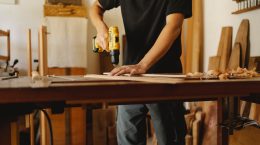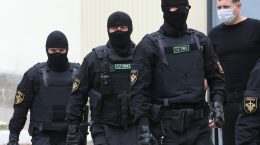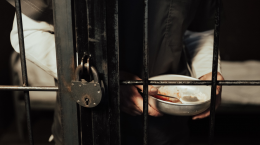Belarusians, sentenced to imprisonment, are forced to work in low-paid jobs in the enterprises under the colonies. The Department of Corrections of the Ministry of Internal Affairs includes 15 enterprises (one agricultural), four branches and nine extra-budgetary production workshops. All of them use slave labour for prisoners, and products are still shipped abroad, as no sanctions were ever imposed on the Department of Corrections enterprises.
The Department of Corrections has a catalogue of products made by prisoners on its website. They make cabinets, shelving units, metal fencing, upholstered furniture, crockery, street exercisers, uniforms for the security forces, medical gowns, shovels, arbours, lamps – and this is by no means a complete list. The prices of the products are impressive: an insulated suit for the ambulance doctor costs 89 rubles (25,20 euro), a coat rack – from 827 rubles (234,20 euro), a regular wardrobe – from 838 rubles (237,32), a gazebo – from more than 1773 rubles (502 euro), a sports complex for floor exercise – from 7671 rubles (2172 euro). However, prisoners’ wages in prisons rarely even reach the minimum wage, and the vast majority receive less than 1 euro.
The “Unit” facility is located next to occupational therapy facility (LTP) No. 6. Patients (or prisoners) make cabinet and garden furniture within its walls. In 2019, Oleg Maksimov, a prisoner at this LTP, described what goes on inside. “The most serious violation is when you don’t work: they immediately put you in a punishment cell or a new way, a disciplinary room. You sit there, and they add another six months to your year of ‘rehabilitation’. For ten months now, I have been in LTP, and I cannot understand how I – a retired pensioner, who earned my rest, freedom, money (pension) till the end of my days, was sent to “prison”, i.e. in LTP and why slave labour was imposed on me? I have been enslaved in retirement, deprived of my freedom,” the man recounted.
Female prisoners of Colony No. 4 work at State Enterprise No. 4. Here they sew uniforms, gowns, work clothes, sports uniforms, linens, hats and clothing for hunting and fishing. Work suits in the company’s catalogue range in price from 40 to 100 rubles (11,33 – 28,32 euro), and insulated uniform jackets cost from 30 to 100 rubles (8,50 – 28,32 euro). Protective equipment for hockey players can be bought for up to 105 rubles (29,74 euro), and a suit for fishing costs 93 rubles (26,34 euro). Women, meanwhile, are paid very cheaply. Journalist Daria Chultsova, for example, is paid less than 50 rubles (14,16 euro), most of which is deducted to compensate for food and lodging. As a result, she left with just over 10 rubles (2,83 euro)on her account. Her colleague Ekaterina Andreeva received only 7.5 rubles (2,15 euro) in September 2021. Refusal to work in the colony is also punishable. For example, Olga Klaskovskaya, sentenced to two years for blocking a road in the capital’s Serebryanka micro-district, was deprived of a food parcel. And Natalia Hershe, already released from the colony, was transferred to indoor prison #4 in Mogilev for refusing to sew uniforms for the security forces.
Prisoners make furniture, metal and textile goods in the colony No. 5. A set of upholstered furniture made by the prisoners’ hands costs over 1,000 rubles. A desk can be purchased for 557 rubles (157,74 euro), a cabinet – for 762 rubles (215,80 euro), and a metal gazebo – for 1000 rubles (283,20 euro). Meanwhile, Mikalai Autukhovich, who served time in the colony, recalled: “In Ivatsevichy penal colony No. 5, instead of meat, we were often served with small pieces of the cheapest boiled sausage in the porridge. When boiled, it would swell and become twice its original size, i.e. what was more in this sausage – meat or soy – is a big question. But in the canteen, you could always ‘buy’ fried fish and fried sausage for cigarettes”. Mikalai Autukhovich opened his veins because of pressure from the administration.
The state enterprise “Penal Colony 8-Poisk” in Orsha produces metal products: garden furniture, simulators, jerrycans, cabinets, wire, nails, bins, doors and more. Trainers cost from 780 to 850 roubles, a metal wardrobe – from 482 rubles (136,50 euro) and a garden swing – 642 rubles (181 euro). Valery Lievanieuski, a political prisoner, political and social activist, served his sentence here. In letters from the colony, he told me that it was almost impossible to slack off from work here. And the salary is 1-3 thousand non-denominated rubles (0,10-0,30 rubles) per month. At the same time, there are no complaints from prisoners, simply because the letters with them are not allowed to leave the colony. In 2014 there was a mass poisoning of prisoners here, but the administration did not comment on it.
The enterprise “IK 13-Berezvechye” produces engineering products, metal products, gardening tools, wooden souvenirs and construction materials. A sculpture of the Belarusian symbol, a bison, is sold for 60 rubles (16,99 euro), a bear with a deck – for 82 rubles (23,22 euro), lumber – for 466 rubles (131,97 euro). The enterprise also provides scrap metal and scrap metal cutting services. The price for the aluminium scrap processing is 399 rubles (113 euro), and for the copper scrap processing – from 765 rubles (216,65 euro). How much do the inmates get? Yuri Lingo spent nine years in Penal Colony No. 13. He chopped up 100-kilograms of waste cables, tractor engines, gearboxes in a dirty workshop and bad light. Yuri received no more than 2,3 rubles for this.
Inmates of the colony No. 20 in Mozyr district worked in the production of concrete, metal and wooden products, windows and gardening equipment. A wooden flower pot, made by inmates, costs 64 rubles (18,12 euro), a mailbox – from 124 rubles (35,12 euro), floorboards – 630 rubles (178,41 euro), skirting boards – from 720 rubles (203,90 euro) and a metal desk – more than 800 rubles (226,56 euro). Human rights are not respected here. It is confirmed by the story of convict Sergey Varov, who ended up in the colony in December 2018. “I was placed in an unheated room, for some reason called quarantine. On the fourth day of my stay there, I was visited by the head of quarantine. When I asked what was going on and asked to invite a medical officer, I was asked to sign so-called commitments and then ask questions. I refused. After this conversation, again without the obligatory medical examination, I was placed in a punishment cell, as I was told, for an indefinite period,” Sergey recalled. In the penal cell, he was deprived of minimum human rights. He was not allowed to change his underwear, staff members were rude to him and humiliated his human dignity, and medical examinations were not carried out.
Prisoners under Article 328 of the Criminal Code, including those convicted as juveniles, are kept in penal colony No. 22. They work in metal and wood processing. One can earn up to 10 rubles at the wood processing plant (although the furniture made by the inmates is sold in France for hundreds of dollars). At the metal dismantling site, the wages are even lower – only 0,7 rubles a month. All this is accompanied by humiliation, lack of overalls, reports and complaints from the administration.
The products, made by the prisoners’ hands, can only be described as bloody. The huge sums of money the Department of Corrections receives for these products go wherever it wants, but not to improve prisons. The international community must protest against the slave labour of prisoners and the violation of human rights by refusing the products of the Department of Corrections. We demand that sanctions be imposed on all penal enterprises without exception and that their products not be purchased.







